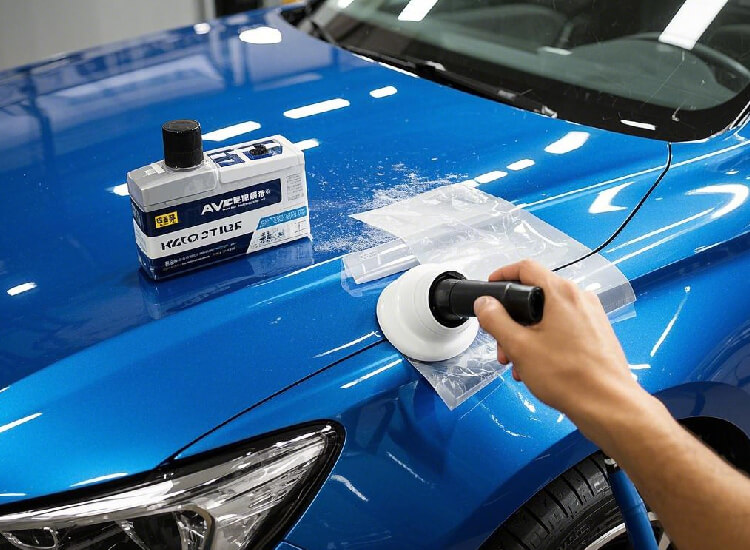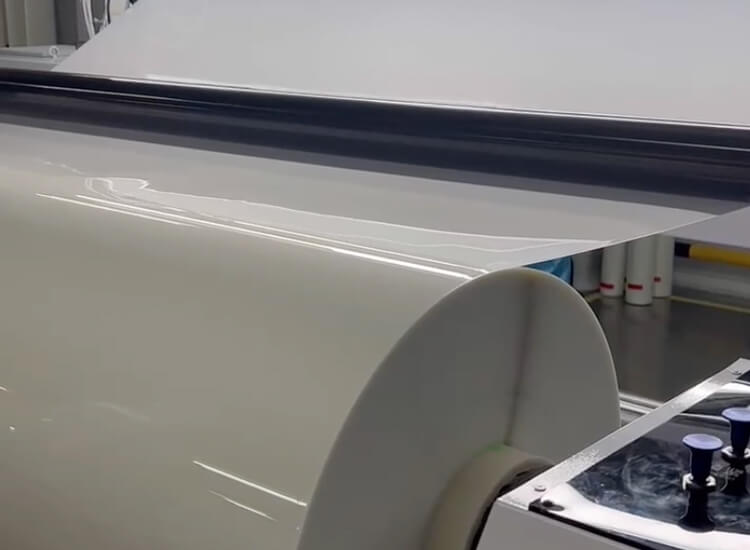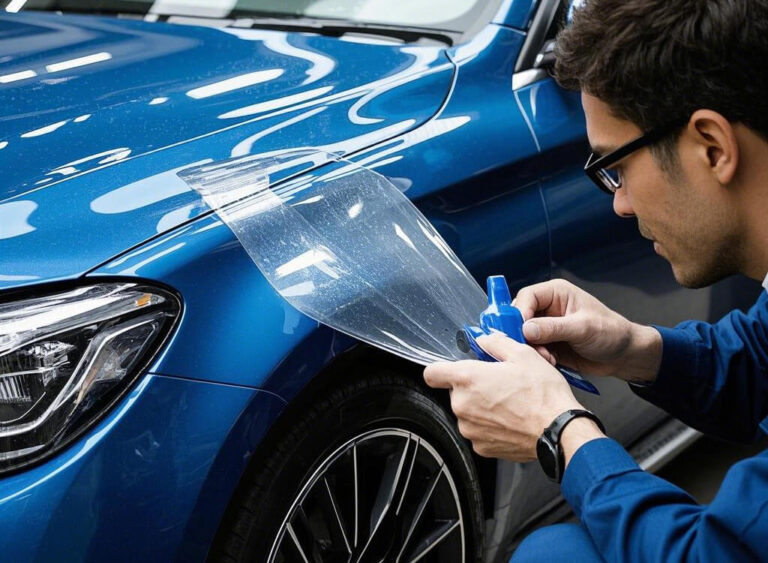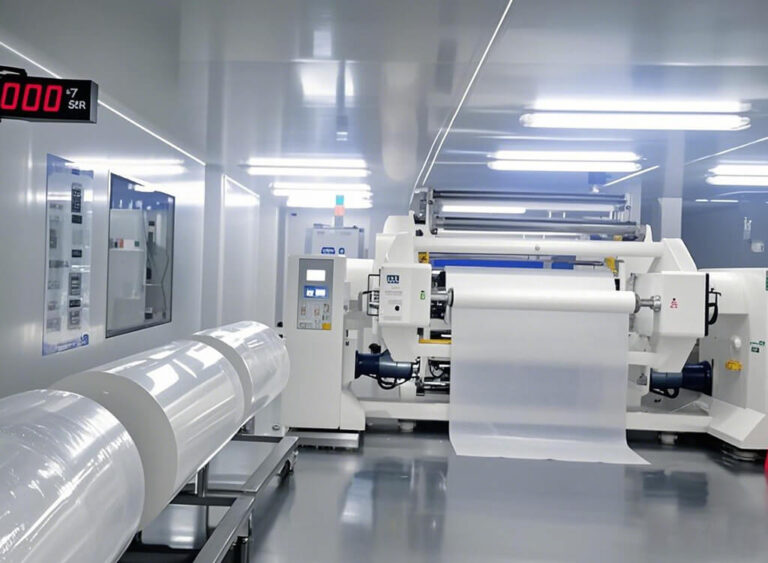The Paint Protection Film (PPF) Cost Guide in 2025
If you’re considering Paint Protection Film (PPF) for your vehicle, one of the biggest questions on your mind is likely: “How much does PPF cost?” PPF is an excellent investment for preserving your car’s appearance and protecting against rock chips, scratches, UV damage, and road debris. However, the PPF cost is affected by several factors. In this guide, we’ll break down PPF pricing, installation costs, and how to get the best value for your money in 2025.

What Is Paint Protection Film (PPF)?
Paint Protection Film (PPF) is a thermoplastic urethane (TPU) or thermoplastic polyurethane-based film applied to a vehicle’s exterior to protect against scratches, chips, stains, and environmental damage. Originally developed for military use, PPF has evolved into a premium automotive accessory that helps maintain a vehicle’s pristine appearance while preserving its resale value.
PPF is available in various finishes, including glossy, matte, and even colored options. Advances in self-healing technology allow the film to repair minor scratches and swirl marks with heat exposure, making it a popular choice among car owners.
What Is Paint Protection Film?
How Much Does Paint Protection Film Cost?
The price of Paint Protection Film (PPF) depends on multiple factors, including the film’s quality, the vehicle’s size, the extent of coverage, and the installer’s expertise. Here’s a general pricing breakdown:
PPF Cost by Coverage Type
- Partial Front PPF Package: $600 – $1,200 (Covers bumper, hood, and side mirrors)
- Full Front PPF Package: $1,500 – $2,500 (Covers bumper, hood, fenders, and mirrors)
- Full Car PPF Protection: $4,000 – $8,000+ (Covers the entire vehicle)
- Track Package PPF: $2,000 – $4,500 (Extra protection for high-impact areas)
- Windshield Protection Film: $200 – $600 (Prevents cracks and chips on the windshield)
- Headlight Protection Film: $100 – $300 (Protects headlights from oxidation and damage)
Average PPF Pricing
-
Partial Front (Hood, Bumper, Mirrors): $800 – $2,000
-
Full Front (Full Hood, Fenders, Bumper, Mirrors, Headlights): $1,500 – $3,500
-
Full Body: $5,000 – $8,000+
Factors Affecting PPF Installation Costs
Material Type: TPU vs. TPH PPF
There are two main types of PPF materials:
- TPU (Thermoplastic Polyurethane): High-quality, durable, self-healing, and long-lasting. More expensive but worth the investment.
- TPH (Thermoplastic Hybrid): Cheaper alternative with lower durability and self-healing properties.
Glossy PPF vs. Matte PPF
- Glossy PPF enhances the car’s shine while providing invisible protection.
- Matte PPF offers a unique satin look for a modern aesthetic.
Ceramic-Infused PPF vs. Standard PPF
- Ceramic-infused PPF includes hydrophobic properties, making it easier to clean and more resistant to stains.
- Standard PPF provides excellent protection but lacks water-repelling features.
Vehicle Type and Size
- Sports cars and luxury vehicles require more precision and labor, increasing installation costs.
- Larger SUVs and trucks need more film, which raises material costs.
Installer’s Experience
- Certified PPF installers charge more but provide higher-quality work.
- Budget installers may offer lower prices but risk improper installation, leading to peeling or bubbles.
Brand and Manufacturer
- Premium brands offer higher-quality raw materials, better clarity, and stronger adhesives, like SunTek, 3M and XPEL.
- Manufacturers in different regions have different costs. For example, the PPF manufacturing cost in China is 30% lower than that in Europe, like ELOV from China.
Is PPF Worth the Investment?
Absolutely. Paint Protection Film (PPF) is a long-term investment that safeguards a vehicle’s exterior from scratches, rock chips, UV damage, and environmental contaminants, preserving its pristine appearance and resale value. With advanced self-healing properties and high durability, PPF significantly reduces maintenance costs and the need for frequent paint corrections. While the initial PPF installation cost may seem high, its long-term protection and cost savings on repairs make it a smart choice for car owners, businesses, and automotive professionals.
But still, many car owners wonder, “Is Paint Protection Film worth it?” The answer depends on your priorities:
- If you want long-term protection against rock chips, scratches, and fading, PPF is an excellent investment.
- If you plan to sell your car in the future, PPF helps maintain resale value.
- If you drive in harsh conditions (gravel roads, highways, extreme sun exposure), PPF is highly beneficial.

Glossy PPF vs. Matte PPF: Which One to Choose?
Selecting the right paint protection film (PPF) depends on aesthetic preference, vehicle type, and market demand. Glossy PPF enhances the original paint’s shine and depth, preserving a factory-fresh appearance. Matte PPF offers a sleek, non-reflective finish, ideal for achieving a modern, satin look while protecting against scratches and stains. Colored PPF combines protection with customization, available in over 80 colors and 60+ customization options, allowing for unique styling and branding opportunities. Whether for luxury vehicles, commercial fleets, or automotive restyling businesses, each PPF type provides durability, self-healing properties, and long-term protection.
-
Glossy PPF: Enhances shine and depth, ideal for preserving the factory paint’s original gloss.
-
Matte PPF: Gives a stealthy, satin look, perfect for high-end vehicles and custom finishes.
-
Colored PPF: Allows for customization and unique styling, available in over 80 color options with 60+ customization choices.
For business owners and wholesalers, offering a variety of PPF finishes ensures you meet diverse customer demands.

PPF vs. Ceramic Coating: Which Is Better?
PPF and ceramic coating both protect a vehicle’s paint, but they serve different purposes. Paint protection film (PPF) acts as a physical barrier, shielding against scratches, rock chips, and stains, while ceramic coating enhances gloss, hydrophobicity, and UV resistance. PPF offers self-healing properties and superior impact protection, making it ideal for long-term durability. In contrast, ceramic coating is easier to apply and maintain but lacks the same level of defense against physical damage. Many car owners choose to combine both for maximum protection and aesthetics.
| Brand | Best-Selling PPF | Key Features | Estimated Market Price (Full Front) |
| XPEL | Ultimate Plus | Self-healing, high gloss, stain-resistant | $1,500 – $3,500 |
| 3M | Scotchgard Pro | Durable, hydrophobic, clarity | $1,200 – $3,000 |
| SunTek | Ultra PPF | High impact resistance, self-healing | $1,400 – $3,200 |
| STEK | DYNOshield | Hydrophobic, glossy, long-lasting | $1,600 – $3,500 |
| ELOV | TPU PPF Series | High-quality raw materials, customizable | Factory Direct Pricing |
| Llumar | Platinum PPF | Excellent durability, stain resistance | $1,300 – $3,200 |
ELOV PPF, as a China-based manufacturer, provides high-quality OEM/ODM PPF solutions with competitive factory-direct pricing for wholesalers, distributors, and brand owners.
Best Paint Protection Film Brands or Manufacturers
When selecting a paint protection film (PPF) manufacturer, quality, durability, and innovation are key factors. Leading manufacturers use high-performance TPU materials from globally recognized suppliers like Covestro and BASF, ensuring superior clarity, self-healing properties, and long-term durability. The best PPF brands offer advanced coating technology, including hydrophobic and anti-yellowing features, to maintain a vehicle’s pristine finish. For wholesalers and distributors, partnering with a reliable PPF manufacturer that provides OEM/ODM customization, large-scale production, and strict quality control ensures consistent supply and competitive market advantage. This post may help you with this topic: Top 12 Paint Protection Film Brands
| Brand | Best-Selling PPF | Key Features |
| XPEL | Ultimate Plus | Self-healing, high gloss, stain-resistant |
| 3M | Scotchgard Pro | Durable, hydrophobic, clarity |
| SunTek | Ultra PPF | High impact resistance, self-healing |
| STEK | DYNOshield | Hydrophobic, glossy, long-lasting |
| ELOV | TPU PPF Series | High-quality raw materials, customizable |
ELOV PPF, as a China-based manufacturer, provides high-quality OEM/ODM PPF solutions with competitive factory-direct pricing for wholesalers, distributors, and brand owners.
How to Find the Best PPF Installer Near You
When searching for PPF installation near me, consider these factors:
- Check reviews and ratings on Google and Yelp.
- Ask about a warranty (most high-quality PPF comes with a 5-10 year warranty).
- Request a portfolio of previous installations.
- Compare pricing but beware of extremely cheap options.

For Wholesalers: Choosing a Reliable PPF Manufacturer
If you’re a wholesaler, distributor, or PPF brand owner, working with a trusted PPF manufacturer is key to success. Here’s what to look for:
• High-Quality Raw Materials: Ensure the manufacturer sources TPU from Covestro, BASF, or other Fortune 500 suppliers.
• Advanced Production Facilities: A dust-free workshop and strict quality control guarantee premium performance.
• OEM/ODM Services: Custom branding, logo printing, and unique formulations help you differentiate your products.
• Fast Shipping & Large Inventory: Having a manufacturer with high production capacity ensures timely supply and competitive pricing.
Get the Best Value for Your Money
The cost of Paint Protection Film (PPF) in 2025 depends on multiple factors, but the right investment will keep your car looking pristine for years. Whether you choose full-car PPF protection, a partial front package, or a windshield protection film, working with an experienced installer ensures you get the best quality and long-term durability.
| ELVO Offers Fast Paint Protection Film OEM |
| 25 Days |
| From Ideas To Mass Production |
| Start OEM For Your Brand Now! |






